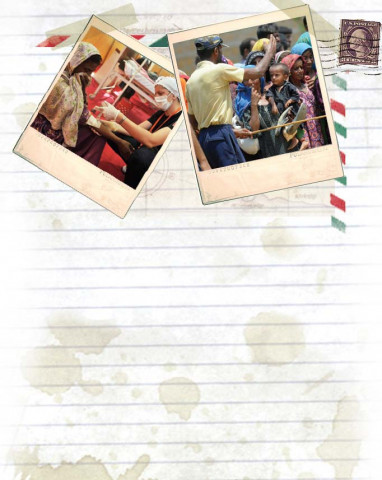Sughra passes away
I stand up to see what is going on. Women are beating their heads and walking towards the ‘professor’s’ shack.

Jokhio sain stands up, pushes his hair back and starts walking towards them. “Jokhio sain!” they cry out in unison. He raises his palm. He has been acting as the elder for these people and even opted to live with them at the camp rather than take up with relatives in Dadu.
A young woman named Sassui speaks up. “Sain! My sister is possessed,” she says. “She has severe stomach aches. The evil spirit possessed her while she was walking back from the canal that night.” Jokhio sain has an amused look on his face. “She definitely has gastroenteritis,” he says.
Gastroenteritis is emerging as the biggest killer in the relief camps of Sindh. According to doctors, four to five survivors are dying every day and most of them are children.
Jokhio sain returns to his hut and picks up some tablets and ORS. He puts his hand on the patient’s head and whispers as if exorcising her. He blows on the tablets and ORS and gives them to Sassui’s sister.
I leave Jokhio sain and move to another camp where the mood is quite somber. Sughra passed away the night before from gastroenteritis, leaving behind four children. The quiet, hardworking woman was popular among the camp’s children as she took care of them as well. Her husband has a herd of cattle to take care of.
Her two sons help gather fodder while the two daughters help their mother. Their daily routine revolves around collecting food from the trucks.
Sughra’s relatives are in two minds whether they should take the body home in Ghouspur or bury her in Sukkur. The graveyard on the outskirts of Ghouspur is flooded but relatives feel her grave should be close to the others.
It’s been more than 20 hours and she must be buried soon. Finally, the elders decide she will be buried in Sukkur. The family casts around for a coffin. Who will perform the last rites? Who will lead the Namaz-e-Janaza. The children are exhausted. They have lost their mother. The camp is gripped by a fear of who might be next.
Finally, someone suggests they contact the Edhi Centre, which comes to their rescue.
Doctors treating the survivors fear gastro may turn into an epidemic. These patients need to go through a course of treatment or they can relapse. They need clean drinking water and they must eat with washed hands. Children are the most vulnerable as it is difficult to monitor them. Doctors ask them to wash their hands but where is the water? There is no drinking water either. The diet has a bare minimum of nutrition, which means low immunity.
As Sughra’s body is prepared for the last rites, young men and women take to the main road once again in a fresh protest demanding that they should be given uncooked food for at least two days at a time so that they can organise their lives rather than run after aid trucks all the time. One young man tells me survivors are dying in traffic accidents as they are village folk and not very traffic savvy.
As all of this happens, I catch a glimpse of Azra - the brave young girl who lost her family and was anxiously waiting to get out of the camp.
She is weak and looks pale. I walk down to her charpoy. Her guardian mother tells me she is suffering from malnutrition and has lost her appetite.
To be continued
Published in The Express Tribune, September 3rd, 2010.



















COMMENTS
Comments are moderated and generally will be posted if they are on-topic and not abusive.
For more information, please see our Comments FAQ